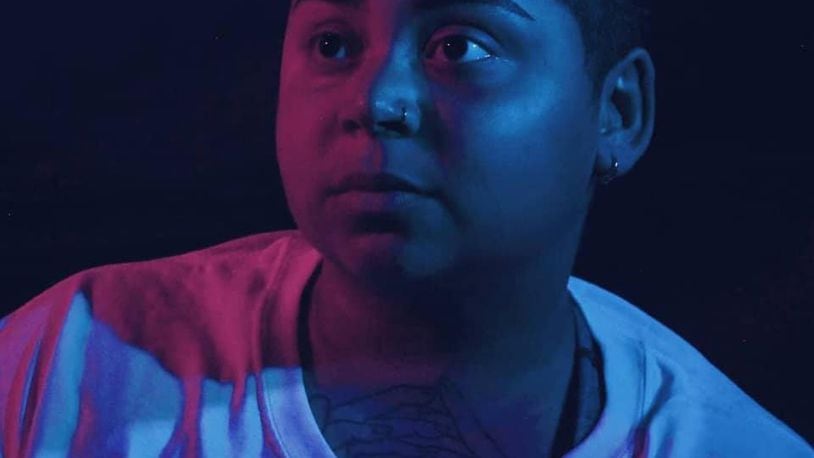This struggle to find an inclusive community in their community painted the story behind their latest film project, “Hot and Bothered.” In the six-episode television show, Byrd recreated a version of their world, set in Dayton and featuring an assortment of issues that still plague Byrd and others like them today.
How do you fit into a community that isn’t built to support people like you? Well, at least for Byrd, you create a television show that puts these specific issues on blast. And, along with local activism, Byrd has done their part to fight for a more inclusive Dayton.
>> JUST ANNOUNCED: Sheryl Crow is coming back to Dayton for summer show
There is still much more to be done, but Byrd knows this. For Byrd, this is just the beginning of a career that seeks to highlight their own creative prowess, along with that of other creatives in more marginalized communities.
Here is a chance to get to know more about our Daytonian of the Week, filmmaker and musician Leah Byrd.
Tell us about your background. What has led you to this point in your career?
I was obsessed with YouTube not long after its creation in 2005, when I was 10 years old. I got my first camera for Christmas when I was in 8th grade and went from there. YouTube was more of an inspiration than the film industry because YouTube had people who looked like me and told stories from my point of view while mainstream cinema didn’t have a path for success for someone like me growing up or really now.
Credit: Photo: Leah Byrd
Credit: Photo: Leah Byrd
When did you get the idea for “Hot and Bothered?” How did it come about?
To be honest, I was very inspired after first seeing the show “Broad City” and learning of their path from web series to TV. After I saw that show I was like “yo, I need to make a web series.” Originally I thought “Hot and Bothered” would be a sketch comedy show.
Why do you feel it’s important to make this television show about the struggles of race, sexuality, equality and so much more, in Dayton, Ohio?
Honestly, because I’m born and raised here and I was just writing what I knew!
Would you say that you’re similar to Liz on “Hot and Bothered?” In what ways, if any, are you different from Liz? What does Liz still have to learn about the world?
The character Liz is more of a reflection of myself and my insecurities and issues I was working through while in undergrad. “Hot and Bothered” was my undergrad thesis film project at Wright State. When I was 19-20 I was very similar to this character and was basically writing an over-dramatized version of myself. I do not feel really any connection to this character now though at the age of 24 - I just have grown over the years and have different insecurities now.
Credit: Photo: Leah Byrd
Credit: Photo: Leah Byrd
Despite the shortcomings that you pointed out in your show, what do you love/like about the city of Dayton?
To be honest, that’s hard to answer. It’s much easier to point out what I don’t like about Dayton than what I do. I’ve never felt a strong sense of community here. I’ve especially felt little to no Black LGBT community here, which is depressing.
What do you owe to the success of “Hot and Bothered?” Why do you think that it has resonated with people outside of just Dayton, OH?
Well, because I think a lot of queer people of color are familiar with the awkward racist every day things that we all have to deal with living and navigating through this colonized world. Dayton’s issues are reflected in most all cities because they echo much larger systemic issues that have been deeply ingrained in our society.
>> WORTH THE DRIVE: Foo Fighters to retrace first tour for its 25th anniversary
Outside of the TV show, what else are you doing to support the film community in Dayton?
I’m not sure. I had a meeting about making the Dayton LGBT Film Festival less white, after I made a post on Facebook calling it out. So I guess I’m pushing for that festival to be less colonized and more inclusive.
Beyond your filmmaking, what are other ways that you remain involved in the local LGBTQ community?
I don’t really feel like there is a space for me in the local LGBT community. Our community is very small and white.
What inspires you about Dayton?
Currently, I’m excited seeing the black projects that are launching here. Baldwin Cafe, Dayton Young Black Professionals, The Dayton Black Inter-generation Artists group. All of that stuff is inspiring and a nice change.
How did it feel to see fellow Dayton filmmakers Steve Bognar and Julia Reichert win an Academy Award? Does it make you even more hopeful for the future of the film community in Dayton?
It was cool, but it wasn’t surprising. They’ve been nominated for several Oscars and they are a white couple and the Academy is made for and by white people. It’s nice that there is a strong network for folks who want to get into documentaries here.
What sort of exciting things do you see for yourself professionally in the next five years?
I’m excited to work on my next film project, and I’m excited to get into releasing music.
When can we expect to see another season of “Hot and Bothered?” How can the community help with this project, if at all?
I feel like I’ve outgrown “Hot and Bothered” and you’ll be hearing about my next project hopefully in the upcoming months if you follow my social media.
About the Author
